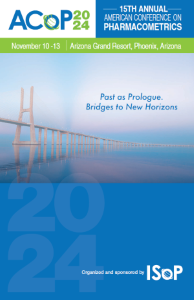Software & Tool Demonstration
(T-060) AI-Driven Innovative Platform in Quantitative Pharmacology: Literature Insights and Automated Model Construction
Tuesday, November 12, 2024
7:00 AM - 5:00 PM MST
Jingcheng Chen, Not Applicable – Doctoral Student, Drug Clinical Trial Center, Peking University Third Hospital, Beijing 100191, China; Jiacheng Wang, Not Applicable – Doctoral Student, National Graduate College for Engineers, Tsinghua University, Beijing 100084, China; Dongyang Liu, Ph.D., Senior Researcher, Ph.D. Supervisor – Deputy Director, Drug Clinical Trial Center; Ph.D. Supervisor; Senior Researche, Drug Clinical Trial Center, Peking University Third Hospital, Beijing 100191, China
- JC
Jingcheng Chen
Doctoral Student
Drug Clinical Trial Center, Peking University Third Hospital, Beijing 100191, China, Beijing, China (People's Republic)
Author(s)
Disclosure(s):
Jingcheng Chen: No financial relationships to disclose
Objectives: Quantitative pharmacology research involves five main steps: literature review and information extraction, data collection and preprocessing, information integration and logical deduction, model development and validation, and model application. These steps often include repetitive, time-consuming work, reducing researchers' satisfaction and consuming research time. Although AI technology has advanced, it's not effectively applied to assist in the initial three steps in quantitative pharmacology. While there are machine learning-based automated modeling toolkits, they lack a comprehensive model library and AI-based covariate screening. Thus, this study aims to explore AI's role in building a quantitative pharmacology research platform to significantly enhance efficiency and support valuable innovations.
Methods: We established a novel quantitative pharmacology platform with six AI agents base on llama3 8B. To optimize interactions, we fine-tuned the platform using DSPy[1]. Each agent's construction is detailed:
1.Platform Manager: Administers interactions for both human-machine and machine-machine layers.
2.Literature Insight: Utilizes gpt-crawler[2] and other crawler frameworks for literature review.
3.Data Analysis: Improves information extraction and processing following pharmacometrics methodologies.
4.Knowledge Inference: Enhances logical reasoning with visualization tools.
5.Automated Modeling: Constructed a model library. Optimized processes of pydarwin toolbox[3-4]. Employed machine learning methods like Random Forest, XGBoost, Support Vector Machine, Gradient Boosting Machine, and Decision Tree for efficient feature (covariate) selection.
6.Application Extrapolation: Fine-tuned for patient data extraction, database building, simulations, and dosage recommendations.
This study took the Dapagliflozin and Metoprolol PopPK model as examples. It compared the accuracy and time efficiency of model construction between two groups of modeling personnel with similar levels, who were compared on their use of an AI platform and traditional methods without prior knowledge of the drugs.
Results: The AI-driven quantitative pharmacology platform comprises functions such as literature insights, data analysis, knowledge inference, automatic modeling, and application extrapolation. Validation studies show comparable drug model structures, with parameter differences between manual and AI platform modeling within 15%. The model-building time has been significantly reduced from 10 days to 2 days.
Conclusions: This study utilized the llama38B model to initially establish a dedicated artificial intelligence core for quantitative pharmacology. Subsequently, additional program components were integrated to create an AI-driven innovative platform for quantitative pharmacology. Examples of Dapagliflozin and Metoprolol PopPK models demonstrate that this platform can reduce the required time by 80% while maintaining accuracy.
Citations:
[1] StanfordNLP. dspy. GitHub. https://github.com/stanfordnlp/dspy
[2] BuilderIO. gpt-crawler. GitHub. https://github.com/BuilderIO/gpt-crawler
[3] Certara. pyDarwin. GitHub. https://github.com/certara/pyDarwin
[4] Li X, Sale M, Nieforth K, Bigos K L, Craig J, Wang F, Feng K, Hu M, Bies R, Zhao L. "pyDarwin: A Machine Learning Enhanced Automated Nonlinear Mixed‐Effect Model Selection Toolbox." Clinical Pharmacology and Therapeutics. 2024;115:758–73.

